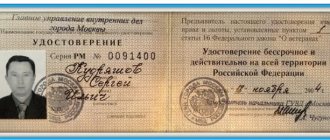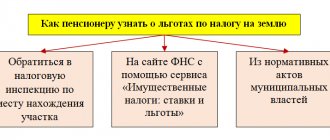05.01.2021
Here we will tell you about all the tax benefits for military veterans: income tax, transport tax, property tax, land tax and state duty. But before we talk about benefits for combat veterans, let’s define who exactly belongs to veterans. Please note that only those persons listed below are, from the point of view of the law, combat veterans and are entitled to claim tax benefits. Then we will detail the tax benefits for veterans based on the taxes they are required to pay.
Who are combat veterans?
The list of people who are considered combat veterans and who are entitled to receive tax benefits is in Article 3 of the Federal Law of January 12, 1995 N 5-FZ “On Veterans”. According to this article, veterans include:
- military personnel (including those transferred to the reserve or retired) of internal affairs and state security agencies, persons who participated in operations during government combat missions to clear mines from territories and objects on the territory of the USSR and the territories of other states in the period from May 10, 1945 to May 31 December 1951, including in combat minesweeping operations from May 10, 1945 to December 31, 1957;
- military personnel of automobile battalions sent to deliver goods to Afghanistan during the period of hostilities;
- flight personnel who flew from the territory of the USSR on combat missions to Afghanistan during the period of hostilities there;
- persons who served military units of the Armed Forces of the USSR and the Armed Forces of Russia, who were located on the territories of other states during the period of hostilities there, who received wounds, concussions or injuries in connection with this, or who were awarded orders or medals of the USSR (or Russia) for participation in providing these combat operations actions;
- persons who were sent to work in Afghanistan in the period from December 1979 to December 1989, who worked the period established upon deployment or were sent ahead of schedule for valid reasons;
- persons sent to other states by government authorities and who took part in hostilities in the performance of official duties in these states, as well as those who took part, in accordance with decisions of the authorities, in hostilities on the territory of Russia.
The list of territories where hostilities took place is given in the appendix to the law “On Veterans”. Persons who took part in hostilities in these territories are considered combat veterans. So, in particular, this is:
- Fighting in Algeria (1962 - 1964);
- Fighting in Egypt (United Arab Republic) (October 1962 to March 1963; June 1967; 1968; March 1969 to July 1972; October 1973 to March 1974; June 1974 to February 1975 (for personnel of minesweepers of the Black Sea and Pacific fleets who participated in demining the Suez Canal zone));
- Fighting in the Yemen Arab Republic (from October 1962 to March 1963; from November 1967 to December 1969);
- Fighting in Vietnam (from January 1961 to December 1974);
- Fighting in Syria (June 1967; March - July 1970; September - November 1972; October 1973);
- Fighting in Angola (from November 1975 to November 1992);
- Fighting in Mozambique (1967 - 1969; from November 1975 to November 1979; from March 1984 to August 1988);
- Fighting in Ethiopia (from December 1977 to November 1990; from May 2000 to December 2000);
- Combat in Afghanistan (from April 1978 to February 15, 1989);
- Fighting in Cambodia (April - December 1970);
- Combat operations in Bangladesh (1972 - 1973 (for personnel of ships and auxiliary vessels of the USSR Navy));
- Fighting in Laos (from January 1960 to December 1963; from August 1964 to November 1968; from November 1969 to December 1970);
- Fighting in Syria and Lebanon (June 1982);
- Fighting in the Republic of Tajikistan (September - November 1992; from February 1993 to December 1997);
- Performing tasks in conditions of armed conflict in the Chechen Republic and in the adjacent territories of the Russian Federation classified as an armed conflict zone: from December 1994 to December 1996
- Performing tasks during counter-terrorism operations in the North Caucasus region: since August 1999
- Fulfillment of tasks to ensure the safety and protection of citizens of the Russian Federation living in the territories of the Republic of South Ossetia and the Republic of Abkhazia: from August 8 to August 22, 2008.
The fact that you are a combat veteran must be supported by documents. For example, a veteran's ID. Only if you have this document are you entitled to claim benefits.
Compensation for housing and communal services
The basis for providing this benefit is Art. 16 Federal Law No. 5-FZ.
In accordance with the law, the recipient of the benefit will receive a refund in the amount of 50% of the total cost of utility bills.
The following housing and communal services are reimbursed:
- Hot and cold water, as well as drainage systems.
- Heating (including compensation for part of the cost of purchasing solid fuel).
- Gas supply.
- Electrical networks.
- Major repairs and house maintenance costs.
You must prove your right to receive compensation payments once every six months. An application for a discount is submitted to the department of social protection of the population.
Income tax benefits for combat veterans
When calculating personal income tax, citizens who took part in hostilities on Russian territory have the right to monthly reduce their income subject to this tax by an amount of 500 rubles. per month. This is the so-called standard tax deduction. This benefit is established by paragraph 1, subparagraph 2 of Article 218 of the Tax Code. Citizens discharged from military service who performed international duty in other countries where hostilities took place are also entitled to this benefit.
Accordingly, you should be charged less tax. Moreover, this deduction reduces any income taxed at a rate of 13 percent (for example, wages, income from the sale of an apartment or car, income under a contract, etc.). For more information about what deductions are and how they are used, see the link.
Example: Your salary is 20,000 rubles. per month.
Situation 1 You are NOT a combat veteran. Accordingly, you must be taxed monthly in the amount of: 20,000 (income) x 13% = 2,600 rubles.
Situation 2 You are a combat veteran. Accordingly, you must be taxed monthly in the amount of: (20,000 (income) - 500 (deduction)) x 13% = 2,535 rubles.
Conclusion From combat veterans, income tax of 65 rubles is withheld. per month is less than that of ordinary citizens who are not veterans. The savings per year will be 780 rubles. (65 rubles x 12 months).
You can receive benefits directly at work (then the tax will be withheld from you in a smaller amount) or you can receive it from the tax office at the end of the year (then the overpaid tax will be returned to you). In the first case, you must submit an application for a deduction to the accounting department at your place of work, to which you must attach copies of documents confirming the fact that you are a combat veteran. Secondly, at the end of the year, you need to submit to the tax office a tax return (form 3-NDFL), an application for a tax refund and copies of documents confirming the fact that you are a combat veteran.
Attention! If you have become disabled in groups I, II and III as a result of a wound, concussion or injury received while defending the USSR, the Russian Federation or while performing other military service duties, then the amount of this benefit will increase for you. It will not be 500 rubles. per month, and 3000 rub. per month. Veterans who became disabled during their service are entitled to this benefit in an increased amount. This benefit is established by subparagraph 1 of paragraph 1 of Article 218 of the Tax Code.
Scroll
The third article of the veterans' law regulating the status of the UBD contains a detailed breakdown of the list of citizens who belong to this category:
- military personnel who are serving and those who went on vacation, including those who were at training camps, employees of law enforcement agencies, the National Guard, state security agencies, employees of the Soviet and Russian ministries of defense, criminal correctional authorities and military personnel who took part in the territory of other states and on the territory of the Russian Federation in hostilities by government decision;
- military personnel who cleared mines in the territories of the federation and the entire Soviet Union, as well as individual states, from 1945 to 1951;
- drivers and other employees of motor battalions, flight personnel who operated from the territories of the former USSR during the Afghan war;
- flight personnel of the military air force and civil aviation who operated in Afghanistan and received any serious health damage or were awarded orders and medals for their actions;
- citizens of the former USSR who worked in Afghanistan from 1979 to 1989;
- citizens who have performed special tasks in Syria since September 2015.
Property
Property taxes for a combat veteran are governed by several provisions of the tax code. As a general rule, it is completely exempt from taxation, but two rules must be observed:
- a zero rate is provided for one object of your choice;
- this premises must not be used for commercial activities.
Let's consider which objects fit the term “non-taxable”:
- private apartment, house, estate, any other dwelling for living;
- premises for organizing and conducting professional creative work - studios, premises for art and other workshops, museum rooms or structures, galleries and other specialized premises for the manifestation of creativity and presentation of its results;
- buildings for housekeeping, household needs, with an area of no more than 50 square meters, which are located in a country house, a subsidiary plot, on land where individual construction is being carried out;
- for the construction and operation of a garage, a place for servicing and parking a car.
Land
Land tax for a combat veteran is a guaranteed discount of 10 thousand rubles. Such rules are prescribed in tax legislation. It also states that if the payment amount is 10 thousand, then there is no need to pay tax at all.
Thus, when calculating the tax on a land plot, the veteran has the right to calculate it using a simple formula: the amount of the cadastral valuation of the land minus 10 thousand rubles and multiplied by the land tax rate.
It is possible to indicate the calculation only approximately, since within the federation there are different rates of these tax obligations on land. They are regulated by municipalities and regional assemblies.
Transport
In the regions - regions - special rates are provided for transport. Each region of the federation has the right to adopt its own amount of this benefit for combatants. There is no general federal size of such a state obligation.
There are territories where such benefits have not been introduced, however, you should know that according to the norms of the tax code, transport payment, that is, a fee for a vehicle, can be collected at the place of registration of the citizen, and not at the place of registration of the vehicle.
The size of the benefits varies quite a lot. For example, in Moscow, UBDs who own one car and its power does not exceed 200 horsepower are exempt from the transport tax. If a veteran owns a second or third vehicle, they are subject to the statutory obligation to pay the full amount of the obligation.
Housing
Combatants also have a number of housing benefits. For example, they receive a 50% discount on residential accommodation fees:
- for the maintenance of housing, regardless of the form of management of the house;
- for major repairs of the building;
- to extend the norm of this benefit to other citizens living together with a citizen with UBI status.
There is also the opportunity to receive improved living conditions, in particular, at the expense of the federal budget.
Another option for additional social protection is installing a landline telephone without a queue.
Personal income tax
The most common type of benefit used. It is not so significant, but in the end it allows you to save quite a significant amount.
For personal income tax, veterans of the DB are provided with benefits in the amount of 500 rubles from the basic amount of income taxation.
Income may include both wages and income from contractual relationships, from the sale of real estate or the sale of real estate. Let us explain how the deduction scheme works with an example.
The income amounted to 25 thousand. This is the tax base at a rate of 13%. Without the discount, the personal income tax would be 3,250 rubles. The benefit allows you to deduct an amount of 500 rubles from the base. The base will be equal to 24.5 thousand rubles. Thus, a tax rate of 13% of the base will amount to a reduced tax payment of 3,185 rubles.
Such a discount can be applied for directly at the tax office or by submitting documents from the employer, who must make deductions in the required amount.
Benefits from the Pension Fund
The pension service provides all benefits provided by law, in particular:
- additional payment every month, which from 2021 amounts to 2972.82 rubles according to indexed indicators;
- monthly compensation in exchange for receiving social benefits.
We are talking about the possibility of choosing to receive benefits or funds. Compensation payments will be for medical and recreational payments:
- in the amount of 863.75 rubles. for medicines;
- RUB 133.62 for sanatorium treatment;
- 124.05 rub. – to pay for travel to the place of receiving medical services;
And also for this category, a special, increased pension rate and an additional payment of at least 32% for the insurance pension are used.
Disabled participants in the DB are entitled to a special pension in the amount of + 300% of the calculated amount and + 100% of the disability allowance.
Medical
The main benefit is the opportunity to receive medications prescribed by attending physicians for the specified category of citizens. Plus, if you provide an ID, you have the opportunity to receive treatment from doctors outside the general queue.
Among the benefits of this category of citizens is the opportunity to receive federally paid prosthetics, including orthopedics. An exception to this benefit is made only for dental prosthetics.
Labor
An important preference for those who have UBI status is the provision of additional labor guarantees:
- the opportunity to receive an additional 35 days of vacation without pay, but maintaining the status of an employee;
- veterans who serve under the general military conscription or contract form of service - additional leave in the amount of 15 days;
- the right to receive labor leave in full according to the decision of the applicant, at a suitable time;
- the right to undergo training in a professional field at the expense of a company or government agency or to improve qualifications in a professional field.
Special working conditions are provided to citizens who have the status of combatants and disability groups 1, 2, 3. This norm is provided for both by special legislation and the Labor Code.
Transport tax benefits for combat veterans
The Tax Code does NOT establish transport tax benefits for combat veterans. That is, they do not exist at the federal level. However, according to Article 356 of the Tax Code, regional and local authorities have the right to establish benefits for this tax for certain categories of citizens. Therefore, in some regions there are transport tax benefits for combat veterans, but in others there are not. Moreover, the benefit can be applied by a veteran, provided that it is established in the region where he lives (that is, at his place of registration). The place of registration of vehicles that are subject to transport tax does not matter.
For example, if a veteran lives in Moscow, and his transport is registered in Samara, then he should take advantage of the transport tax benefits that apply in Moscow (that is, at his place of residence). He is not entitled to any benefits under the legislation of Samara. If he lives in Samara, and the transport is registered in Moscow, then he must enjoy the benefits established by Samara legislation.
Attention! Each Russian region has its own rules of application and benefits for transport tax. For example, in Moscow, military veterans are exempt from tax for one vehicle that is registered to them (clause 1, subclause 5, article 4 of Moscow Law No. 33 dated 07/09/2008). Moreover, since 2013, this benefit applies only to cars with an engine power of no more than 200 hp. (147.1 kW). If you live in Moscow, but your vehicle has at least 1 horsepower more engine power, then you are not entitled to this benefit.
Example: A combat veteran lives in Moscow at his place of registration. He has a vehicle, which is also registered in Moscow.
Situation 1 Two cars are registered to a veteran. One with an engine power of 150 hp. power, second - 190 hp. strength In this situation, he has the right to independently choose for which car he will not pay transport tax. It is more profitable for him not to pay tax on the second car (the tax amount on it is higher). Moreover, for the first car (150 hp) he is obliged to pay tax on a general basis.
Situation 2 Two cars are registered to a veteran. One with an engine power of 120 hp. power, second - 210 hp. strength In this situation, he has the right not to pay tax only on the first car (120 hp). For the second car (210 hp), he is required to pay tax on a general basis.
Situation 3 Two cars are registered to a veteran. One with an engine power of 250 hp. forces, the second - 300 hp. strength A combat veteran is not entitled to benefits for any vehicle. For each of these cars he is obliged to pay tax on a general basis. The tax is calculated based on the full power of each car (250 and 300 hp) without any reduction.
Situation 4 One car with an engine power of 280 hp is registered to a veteran. strength He is not entitled to benefits. He is obliged to pay tax on this car on a general basis based on the full engine power of the car (280 hp) without any reduction.
In order for a combat veteran to receive a transport tax benefit (if you are eligible for it), you must write a special application to the tax office. For a sample application for benefits, see the link.
Assistance in purchasing a home
Article 16 of Federal Law No. 5-FZ guarantees a participant in combat operations assistance from the state, which is aimed at improving living conditions.
The benefit is provided as a subsidy based on the criterion of need. The exact amount of compensation is not established by law. Its size depends on the number of family members of the beneficiary.
In order to receive a subsidy for the purchase of housing, in 2022 you must meet one of the following requirements:
- Do not own residential premises (this rule also applies to family members of the veteran).
- Live in a room that does not meet sanitary and hygienic standards.
- The area of the apartment or house does not meet established standards.
Accommodation in a dormitory, communal apartment or office space is allowed.
The subsidy is provided strictly upon application. Thus, this benefit can extend to those who have declared their rights in the prescribed manner.
Property tax benefits for combat veterans
Combat veterans have a property tax benefit. It is established by subparagraph 4 of paragraph 1 of Article 407 of the Tax Code (more details below).
Citizens with a total duration of military service of 20 years or more, who are discharged from military service upon reaching the age limit for service, for health reasons or in connection with organizational and staffing measures, are completely exempt from paying property tax. This benefit is established by subparagraph 7 of paragraph 1 of Article 407 of the Tax Code.
Veterans discharged from military service or called up for military training who performed international duty in countries where hostilities took place also do not pay tax on the value of real estate. This benefit is established by subparagraph 11 of paragraph 1 of Article 407 of the Tax Code.
In addition, local authorities have the right to introduce additional benefits for certain categories of citizens (including veterans). However, in many regions of Russia there are no additional property tax benefits for combat veterans (for example, in Moscow).
Benefits are provided to veterans in relation to:
- apartments or rooms;
- residential building;
- creative workshops, ateliers, studios, museums, galleries, libraries used in the professional creative activity of their owner;
- buildings with an area of up to 50 sq. m. (inclusive) located on land plots provided for personal subsidiary plots, dacha farming, vegetable gardening, horticulture or individual housing construction;
- garage or parking space.
The benefit can be received only for one object of each type.
Example A combat veteran owns property that is subject to property taxes.
Situation 1 A veteran owns two apartments. He has the right to receive benefits only under one of them (at his choice). Obviously, you need to choose the apartment for which the largest amount of tax is charged. Then you won’t have to pay tax on the cost of the apartment.
Situation 2 The veteran owns:
- three apartments;
- two residential buildings;
- two garages.
A combat veteran has the right not to pay tax on the value of:
- one apartment;
- one residential building;
- one garage.
You need to select those objects on which you will not pay tax yourself. As in situation 1, for the benefit you need to select objects with the maximum amount of annual tax.
The legislative framework
The Tax Code and the law for regulating social and other guarantees for veterans make it possible to fully understand what tax benefits a combat veteran is entitled to for this category of citizens.
Dear readers!
Our articles talk about typical ways to resolve legal issues, but each case is unique. If you want to find out how to solve your specific problem, please contact the online consultant form on the right →
It's fast and free!
Or call us by phone (24/7):
If you want to find out how to solve your particular problem, call us by phone. It's fast and free!
+7 Moscow,
Moscow region
+7 Saint Petersburg,
Leningrad region
+7 Regions
(the call is free for all regions of Russia)
In addition, there is a rather comprehensive annex to the veterans’ law, which defines a list of states and territories where military operations took place with the participation of citizens of the federation. These issues are partly addressed by the Labor Code and the pension law regulating the provision of veterans.
Benefits for combat veterans on land tax
To determine the amount of land tax, the cadastral value of the land is multiplied by the tax rate. In terms of land tax, combat veterans are entitled to benefits. It is established by paragraph 5 of Article 391 of the Tax Code. This benefit does not imply complete tax exemption. It provides that 600 square meters of land are not subject to tax.
If the area of the plot does not exceed 600 sq. meters, then the combat veteran will not have to pay land tax. If it exceeds, then veterans pay tax only on the excess amount.
The benefit is applied to one plot of land, which is located in one region (municipal entity). If a combat veteran owns several plots of land in different regions, then the benefit can be used for each of them.
Example A combat veteran owns land.
Situation 1 There is one area. Its area is 900 sq. meters, cadastral value 86,000 rubles. The land tax rate in the region is 0.3%. The amount of tax that must be paid taking into account the benefit will be: (86,000 - 86,000: 900 sq. m. x 600 sq. m.) x 0.3% = 86 rubles.
Situation 2 There are two plots. Both are located in the Lipetsk region. The area of the first is 900 sq. meters. Cadastral value 86,000 rubles. The area of the second is 300 sq. meters, cadastral value - 74,000 rubles. The land tax rate in the region is 0.3%. The amount of tax that needs to be paid taking into account the benefit will be: (86,000 - 86,000: 900 sq. m. x 600 sq. m. + 74,000 x 0.3% = 308 rubles.
Situation 3 There are two plots. One in the Lipetsk region. Area 700 sq. meters, cadastral value 35,000 rubles. The second, in the Oryol region. Area 800 sq. meters, cadastral value 94,000 rubles. The land tax rate in the Lipetsk region is 0.3%, in the Oryol region - 1.5%.
Amount of tax to be paid:
- for a plot in the Lipetsk region: (35,000 - 35,000: 700 sq. m. x 600 sq. m.) x 0.3% = 15 rubles.
- for a plot in the Oryol region: (94,000 - 94,000: 800 sq. m. x 600 sq. m.) x 1.5% = 353 rub.
The total amount of land tax is 368 rubles. (15 + 353).
Legislation
At the federal level, the general procedure for obtaining land from municipal authorities is regulated by the Land Code.
This is where you can find out how an application for a plot is submitted and what is needed for this.
Despite the absence at the state level of a norm establishing
This is due to the fact that now issues of distribution of municipal lands are within the competence of local authorities. Therefore, it is necessary to clarify whether veterans are entitled to free land with local authorities or authorized committees.
For information, you can also contact the local veterans' council, which is well acquainted with the specifics of municipal legislation.
Among the standard conditions for the allocation of plots to veterans in regional legislation, the following are usually found:
- they have no other land in their ownership;
- they are recognized as in need of improved housing conditions;
- they have been permanently residing in the region for at least 5-10 years.
It is worth noting that the changes in legislation did not affect all veterans.
The law retained the right to gratuitous plots for military personnel who were awarded the Hero of the USSR, Hero of Russia and Knights of the Order of Glory.
If we turn to the current “Law on Veterans” (FZ-40 of 2000), then there is no provision for the provision of free land.
Meanwhile, the law establishes the right to certain privileges for this category of persons when joining gardening, housing, garage and dacha cooperatives.
Such a benefit has little practical meaning, since it is not so difficult to join these communities even without various preferences.
The said veterans law provides a detailed list of persons who are entitled to certain benefits.
This:
- active and retired military personnel;
- military pensioners;
- composition of the Ministry of Internal Affairs of the Russian Federation, the USSR and the Security Council;
- rank and file and officers of security agencies;
- persons who took part in special missions to clear mines on the territory of the USSR;
- participants in military operations in Afghanistan, etc.
A broad category of veterans consists of labor and WWII veterans.
Benefits for combat veterans at state duty
Combat veterans seeking protection of their rights established by the legislation on veterans have the right not to pay state fees in cases heard by courts of general jurisdiction (civil courts) and magistrates. The necessary benefit is specified in subparagraph 3 of paragraph 2 of Article 333.36 of the Tax Code. This benefit applies provided that the value of the claim does not exceed RUB 1,000,000. If it exceeds, then the duty is paid at a reduced rate.
The claim must be related to the protection of your rights established specifically by the legislation on veterans. Only then do you have the right not to pay the duty. For example, if you are denied a particular veterans' payment or benefit required by local, state, or federal law. This benefit does not apply to other claims. Therefore, if you decide to file a claim against a neighbor who flooded you with water, you will have to pay the fee in accordance with the general procedure.
Can they refuse?
The issuance of a veteran's ID card may be refused. The reason often turns out to be the insufficiency of the collected package of documents. However, no one limits the applicant in the number of applications. Therefore, you can always reapply.
An unjustified refusal gives the citizen the opportunity to go to court. This right also arises in the event that government bodies evade mandatory payments or provide social services to already recognized veterans of the military service.
Significant government support in the form of benefits and payments is provided to combat veterans and members of their families. The deadlines for consideration and the rights of applicants are established by law. In 2021, beneficiaries can count on an increase in the volume of social assistance.
How to get a veteran's tax benefit
It depends on which tax you plan to receive a benefit for. The listed taxes can be divided into 3 categories:
- the first one is calculated by the tax office and you pay it based on a receipt received from the tax authorities. These are transport tax, property tax, land tax;
- the second - which are withheld from you at work and, if the tax was not withheld, you must pay yourself. This is an income tax;
- third - which you pay yourself. This is a state fee.
To receive a tax benefit of the first category, you need to send an application for a tax benefit to the tax office (sample and official form, see the link). The application must be sent to the tax office that sends you a receipt for tax payment. For transport tax, this is an inspection at the place of your registration (residence), for property tax, an inspection at the location of the property, for land tax, an inspection at the location of the land plot. Please attach to your application copies of documents that confirm the fact that you are a participant in hostilities.
You can receive a tax benefit of the second category (on personal income) at your place of work. To do this, write to the accounting department a statement in any form stating that you want to receive a tax deduction. Please attach a copy of documents that confirm your status as a combat participant to your application. Then the accounting department will sort it out on its own.
You have the right to receive a benefit for paying state fees directly in court when filing a claim. Here you simply won't pay duty. In this case, the claim must also be accompanied by documents confirming your participation in hostilities.
Documents for obtaining a tax deduction
To receive a tax deduction, the beneficiary must contact the Federal Tax Service office at his place of registration and provide the following package of documents:
- Passport, which is the applicant’s identity document.
- A document that confirms that the applicant owns property.
- TIN.
- Registration information.
- Combat Veteran Certificate.
- If instead of the beneficiary his interests are represented by another person, a power of attorney from a notary is additionally provided.
- The list that is compiled last is an inventory of all submitted papers.
On a note! The list of documents presented above is the main one, regulated at the federal level (clause 3 of Article 218 of the Tax Code of the Russian Federation). But the list may be increased by local authorities.
Application Form
To apply for a tax deduction, a citizen must correctly complete an application.
Only a document drawn up in accordance with the requirements of regulations is accepted for consideration, although the form of such an application is not approved by law. It is recommended to include the following information in your application:
- The official name of the government agency where the application is being submitted.
- Applicant's passport details.
- Information about TIN.
- Application registration address.
- Contact details for communication.
- Request for a tax deduction.
- A complete list of all documentation attached to the application.
- The date when the applicant submitted the application.
- Applicant's signature and transcript.
It is advisable to make a reservation in the application that the taxpayer does not receive a deduction from other tax agents.
The completed document is submitted to the FMS department located at the place of registration of the beneficiary. If a citizen wants to receive a tax deduction on a monthly basis, this document is submitted to the accounting department of the organization where he is officially employed.
If a representative acts on behalf of a citizen, the application is drawn up by the beneficiary. The person who will actually be involved in submitting documents to a government agency will have to provide a notarized power of attorney confirming the legality of the right to carry out such actions.
An application for a tax deduction to the Federal Tax Service is prepared in two forms:
- One is returned to the applicant with a note that the documents have been accepted for consideration.
- The second is attached to copies of the provided documents for transmission to the inspector.
Advice! It is not necessary to submit an application for a deduction to the tax office in person; you can send it to the Federal Tax Service by mail in a certified letter with acknowledgment of receipt.
Probable reasons for refusal to deduct
Persons claiming the right to a deduction may, in some cases, be denied. The benefit is not provided in the following cases:
- The veteran does not have the required form of identification.
- Failure to comply with the deadline for applying for benefits to the employer. The deduction is applied from the month following the receipt of the application.
- Submitting an application for a deduction if there is more than one place of employment without presenting a certificate from another employer stating that the deduction is not applied. If there is no employment since the beginning of the year of receipt, the employer will not be provided with a certificate.
When applying to the Federal Tax Service to recalculate the tax and receive an overpayment, a refusal may be received due to inconsistencies in data, errors in the declaration, or the statute of limitations has passed.
Who is entitled to benefits?
The following are exempt from paying ZN:
- penal institutions;
- organizations with the participation of people with disabilities;
- religious organizations;
- organizations related to folk crafts;
- various organizations operating in special economic zones. Exemption from the ZN is given to them for 3 years or 5 years;
- companies working in innovation;
- shipbuilding organizations operating in a special economic zone.
These companies are exempt from the ZN for 10 years.
Individuals from among small indigenous peoples living in Siberia, the North or the Far East can enjoy the benefit of complete exemption from PL.
The benefit for reducing the tax base can be used by heroes, disabled people of the first and second groups, veterans of wars and combat operations. Chernobyl victims and other persons exposed to radioactive radiation at enterprises and test sites during the production and testing of nuclear weapons can receive a benefit to reduce NB by 100,000 rubles.
Partial tax benefits by reducing tax are determined by decisions of local municipal bodies or laws of federally subordinate cities.
For example, in the capital of the Russian Federation there are no benefits for land plots for a summer cottage. In the northern capital, owners of land plots do not pay ZN if the area of their plot is no more than 2500 m². In Saratov, owners of land plots with an area of up to 600 m² do not pay ZN if their land plot is not used for business.
Provision according to general rules
- make a choice of a suitable allotment. It is first necessary to obtain some information about the land - the type of permitted exploitation. Thus, he does not allow him to subsequently build his own house on agricultural land. You can get information from the administration or on the official website of Rosreestr;
- provide evidentiary documentation of the existence of legitimate claims and evidence of compliance with established requirements;
- buy the plot at auction by paying the market value of the property.
If a military family is officially recognized as in need of improving the conditions of their place of residence, then the procedure can be expedited.
- A document confirming registration as a family in need.
- Certificate from the BTI and information extract (who is registered, how many people).
- About the composition of a veteran's family.
- Certificates of birth of children and marriage.
- Cadastral passport for real estate.
- 2-NDFL (required in special cases).
In addition to the submitted documents, a completed application form is submitted to the authorized institution. Subsequently, an auction is expected to be held at which the land plot can be purchased. Sometimes auctions are not held, and the site, by decision of the municipal government, is transferred to individual ownership for a specific fee. The administration has the right to respond to the appeal within 30 days after receiving the application.
IMPORTANT !!! If a positive decision is made, then the applicant is required to pay the cadastral value for the plot, register a sales agreement with the municipality, and privatize the land plot into private ownership
- passport of the applicant;
- cadastral passport for the object;
- veteran's ID;
- agreement on the acquisition of a plot of land;
- boundary plan of the site;
- protocol of the auction and determination of its winner;
- order of local authorities on the allocation of land;
- privatization agreement;
- receipt confirming payment of the state fee for registration actions;
- payment document confirming payment for land.
After a month, the applicant will be able to receive a certificate. If during the process of checking the submitted package of documentation questions arise from authorized persons, then a reasoned refusal is issued. Once the shortcomings have been corrected, you are allowed to re-submit your application.
The most common reasons for refusal are:
- A partial list of documentation is provided.
- Typos and corrections were found in the papers.
- The documents are unreliable.
How to simplify the process
There is such a concept in the issue of land allocation as “family need”. If it is possible to collect the necessary documents confirming such a need, the plot can be obtained much faster. What do you need to prepare?
- Certificate that the family is registered with the city administration as needy.
- A certificate from the BTI and an extract from the house register.
- Family composition certificate.
- Marriage and birth certificates.
- Cadastre passport for existing housing.
- Sometimes Form 2-NDFL is also requested.
Such papers are submitted to the authority that deals with the allocation of land.
On the grounds and conditions of the preferential procedure
The scope of rights and the actual description of the categories of beneficiaries who claim the title “veteran” are spelled out in Federal Law No. 5 “On Veterans...”. According to the provisions of Article 1 of Federal Law No. 5, these are citizens with officially confirmed status:
- Veteran of World War II.
- Active participant in combat operations. A citizen who received the definition for services to the Fatherland during the fighting, defending the interests of the Russian Federation.
- Having served beyond the required period in the ranks of the SA or the RF Armed Forces.
- Veteran of Labor who made a great contribution to the development of the country.
These people are given benefits in the areas of public and social life. The priority for using benefits is not given to everyone by the state. The law regarding the situation is categorical - the plot is allocated free of charge exclusively to a veteran of the Great Patriotic War who needs it.
The key point is who, on the basis of Art. 3 Federal Law No. 5 refers to combat veterans:
- Military personnel, formerly or currently serving as government employees, in reserve or in retirement, whose primary duty is to protect the interests and security of the state.
- Military or citizens liable for military service who took part in hostilities within the borders of the Russian Federation or abroad while protecting the interests of the country.
- Participants in mine clearance operations in regions affected during the Second World War from 05/10/45 to 12/31/51.
- Internationalists sent to the DRA during hostilities to supply the military contingent of the USSR and help the people of the Republic of Afghanistan suffering from the war.
- The flight and technical personnel of the USSR Air Force regiments located in the DRA during the military conflict.
- Seconded to the DRA to work from December 79 to the end of 89.
- Seconded to the SAR from September 30, 2015 to the present day. Tasks do not determine status.
Thus, a civilian who has performed professional functions to promote the combat missions of the Armed Forces of the Russian Federation in the regulations of the current armed conflict can receive veteran status.
What documents will be needed
The main document when applying for an allotment is the application itself (in two copies). This paper must indicate:
- Veteran’s personal information, name and address;
- His contact details;
- The grounds on which he claims the site;
- What will be his right to this object (ownership, rent or free use);
- Scheme of the location of the object on the cadastral plan-sekhem;
- List of documents that are attached to the application.
Among the papers that are included in the package of documents along with the application:
Passport of the applicant and everyone in his family; If a representative of a veteran applies, then a power of attorney certified by a notary;
Certificate of participation in hostilities; Documents confirming that the applicant does not own other real estate.
You can also include documents about disability and the right to live in a social rented apartment.
Helpful advice
These documents can be submitted in person, sent via mail or electronically via the Internet.









